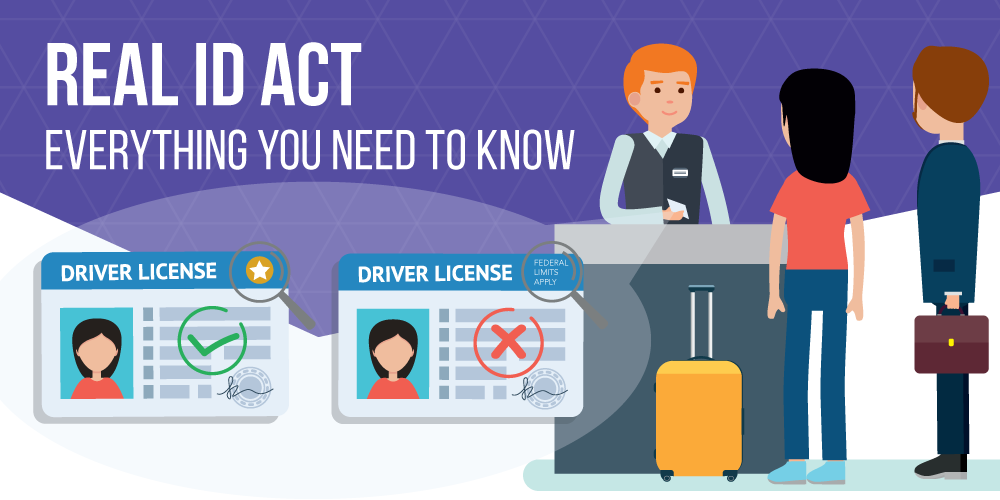#RealD #DriversLicense #Travel #Airport #HomelandSecurity #TSA
Think your driver's license is enough to get you through airport security in the United States and onto your domestic flight? Maybe not.
Some two-thirds of US state driver's licenses are not compliant with a post-9/11 security law set to go into effect on October 1. Those who are not compliant will not be able to fly if they don't have other forms of "REAL ID-compliant" identification.
Concerned about the impact on travel, the head of the US Department of Homeland Security loosened the restrictions this week, allowing the various state agencies to accept identity documents electronically.
While Wolf says this "pre-submission" of documents will result in a faster application process, it's not clear how much faster it will be.
The REAL ID Act, which established minimum security standards for the issuing of state licenses and their production, prohibits federal agencies from accepting licenses from states not meeting those minimum standards for certain activities.
To get a REAL ID-compliant state driver's license, the DHS requires applicants to provide documentation showing their full legal name, their date of birth, their Social Security number, two proofs of the address of principal residence and lawful status. States may impose more requirements.
If you can't produce acceptable identification, your US airport's Transportation Security Administration (TSA) checkpoint will not clear you for flight. The TSA is part of the Department of Homeland Security. That could lead to serious backups at US airports starting October 1.
While many states have been issuing compliant documents for years, travelers shouldn't assume their driver's licenses and other documents meet the requirements. For example, Georgia became compliant in 2012 and California became compliant in 2018, but their driver's licenses issued prior to those times in those states are not compliant.
Check if your state driver's license or identification card is REAL ID compliant simply by looking for a star in the upper right-hand corner. Some state departments of motor vehicles will confirm REAL ID status online.
The Department of Homeland Security reported this week that 48 of 50 states in the US are REAL ID compliant, up from January 2017, when only 26 states were. The two remaining states that haven't started issuing new IDs are Oklahoma and Oregon.
Collectively, those 48 states have issued more than 95 million REAL ID-compliant driver's licenses and ID cards.
While the US Travel Association applauded the government's "pre-submission," decision, "the challenge remains that tens of millions of Americans do not yet possess REAL ID-compliant identification," said Tori Emerson Barnes, USTA executive vice president of public affairs and policy, in a statement.
The REAL ID Act's requirement were part of the 9/11 Commission's recommendation that the federal government set standards for the issuance of sources of identification, according to the Department of Homeland Security.
Since the act's 2005 passage, the federal government has implemented TSA Pre-Check and other programs that offer more security than REAL ID, said Barnes.
That's why the USTA is lobbying federal authorities to accept membership in those programs as a substitute for REAL ID. (DHS hasn't said yes, at least not yet.)
Officials at USTA, which represents major airlines, hotels, state and local tourism boards and other travel industry members, worry that their members will lose customers who suddenly can't fly within the US starting October 1, 2020.
• REAL ID-compliant state driver's licenses or other state photo identity cards
• US passport
• US passport card
• DHS trusted traveler cards (Global Entry, NEXUS, SENTRI, FAST)
• US Department of Defense ID, including IDs issued to dependents
• Permanent resident card
• Border crossing card
• State-issued Enhanced Driver's License
• Federally recognized, tribal-issued photo ID
• HSPD-12 PIV card
• Foreign government-issued passport
• Canadian provincial driver's license or Indian and Northern Affairs Canada card
• Transportation worker identification credential
• US Citizenship and Immigration Services Employment Authorization Card (I-766)
• US Merchant Mariner Credential
Check the Department of Homeland Security website for more information.
By Katia Hetter, CNN


Comments
Post a Comment